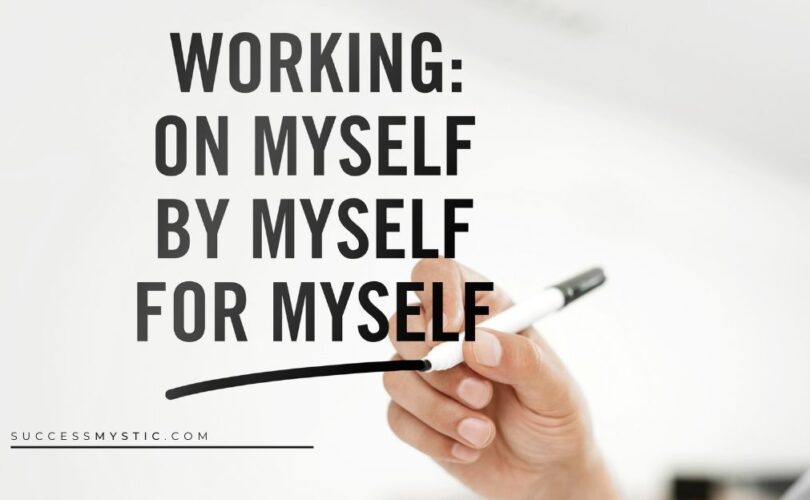If you’ve been living a chaotic, unbalanced life of providing services to others without taking time to care for yourself, you’re likely feeling frazzled and unproductive. This state of being isn’t sustainable long term and will most likely end in disappointment or disaster.
Spending too much time outside of yourself and not enough time attending to your own needs can not only lead to poor health and wellbeing.
Learning how to live a life that finds balance between self-care and caring for others is truly an art. Understanding the art and science of self devotion, how it works, and the benefits it reaps is important for all folks to understand. Even if you struggle to maintain this balance, it is something you can practice.
Examples Of Being Devoted To Oneself
Self devotion can take on many forms and examples. When you’re being self devoted, it means you’re paying special attention to your own needs and desires. Rather than allowing the world around you to consume all your energy, you make sure you’re channeling that effort into caring for yourself. Self devotion can look differently from person to person.
Consider the following examples of being a self devoted person:
- Janelle goes to her favorite yoga class once per week. No matter how busy her schedule is, she always makes sure she clears enough time to practice yoga in her favorite class setting because it offers her lots of calmness and peace afterward.
- One of Dennis’ close friends has been pushing his personal boundaries lately. When Dennis began noticing this behavior was forming a pattern, he had a private conversation with his friend to address the issue and explain why his personal boundaries are so important to him.
- Ana started attending regular therapy sessions because she needed help handling her big emotions and wanted to take good care of her mental health.
- Mrs. Smith is a talented teacher who is very involved with her students. To ensure that she’s always her best self for her kids, she takes her summer breaks seriously–she goes on fun vacations, relaxing spa days, and participates in activities she enjoys.
- Georgio is a new father. He and his wife split responsibilities with their new baby evenly so each parent can have some much-needed alone time to recuperate and destress.
- Dr. Bradford doesn’t take any calls from patients after 5pm. When she leaves her clinic at the end of the work day, she turns off her cell phone so she can focus on her personal needs and enjoy her free time in a recharging and relaxing way.
- Brenda spent many years caring for a husband who didn’t appreciate her. Brenda decided to leave the toxic relationship so she could rediscover herself, reclaim her independence, and live her life in a way that pleases her.
- Mark went to a party with friends and was offered drugs for the first time. Instead of participating, he declined the offer–he knows drugs can ruin your health, and he didn’t want to risk harming himself that way.
Self devotion can take on many forms. In every iteration, there are some commonalities: Self devotion means living your life in a way that honors yourself. You look after your needs and make choices that respect your boundaries.
A self devoted person knows that attending to their needs and caring for themselves is necessary to feel happy and healthy. It isn’t being selfish–it’s showing self respect.
Positive Effects Of Being Devoted To Things Outside Yourself
Finding a cause or people to care for can be a highly enriching and rewarding experience. By giving time, energy, and resources to others or causes that need it, you can feel a serious sense of importance beyond yourself. When you’re able to balance that devotion and self-care properly, you can reap some fabulous effects, including the following.
1| A sense of worth and purpose.
When you’re able to approach devotion to another person or cause in a healthy way, you can feel an intense sense of self-worth and purpose. Knowing that you’re spreading some extra goodness to someone or something else that desperately needs it is a wonderful feeling.
Feeling that sense of worth and purpose also connects your life into the greater scheme of the universe. Knowing that you’re being helpful and doing some good can feel a lot like finding your specific place in the greater universe. This feeling is quite powerful–it connects you with many other people and forces outside of yourself.
Some people feel a great sense of worth or their life’s purpose when they’re able to devote to a cause outside of themselves. Whether you’re helping a friend in need, pushing yourself hard at work, or assisting a cause you feel strongly about, devotion to something outside of yourself can be ultra rewarding work.
2| A sense that you’ve put some serious positive energy out into the universe.
Spending your time and energy for the benefit of someone or something else other than yourself is a way to do some serious good in the world. Buddhists and Hindus refer to this practice as karma, or the transference and return of energy between one person and others around them.
Simply put, when someone does good, that good returns back to them in the form of blessings and prosperity. Just like in Buddhism and Hinduism, many other religious and spiritual groups believe doing devotional work is a key part of being a healthy and helpful member of society.
When you care about things outside yourself, you recognize the importance of being kind and caring toward other people, spreading positive karma through your actions.
3| A stronger sense of self confidence in your abilities to do good.
When you do good, you feel good. Devoting yourself to another person or cause can be a time consuming and sometimes difficult process, but every time you work toward bettering someone else’s situation or a cause you care about, you’re boosting your own self confidence as well.
When you do good work (and know you’ve done a good thing for someone), it’s a major confidence boost. Nothing feels quite like knowing you’ve done good, honest work. Enjoy this positive side of your devotion.
4| Stronger relationships with the person(s) you’re helping through devotion.
Often, when you’re devoted to helping someone else through a struggle or difficult time, it strengthens the relationship you have with that person. When someone obviously needs or vocalizes a need for help, it takes a great amount of strength and vulnerability to admit.
By answering the person’s call for help and subsequently “entering” the situation, you’re likely to see that person in a very humbled state. For example, when someone is battling an illness, they’re likely sick, defeated, and burned out. Working together with this person to help them through their tough situation can really strengthen the bond you already have with that person.
5| Tons of learning opportunities, personal growth moments, and challenges.
No matter the circumstances of your devotion, the experience is always a chance for a learning opportunity. Being devoted to anything is a challenging business–you’ll be tested with new scenarios, strife, and moments that require you to test your limits.
The work can be exhausting and difficult, but ultimately, it’s an excellent experience for growth. Devoting yourself to another person or cause is a great way to learn more about the world outside of your own mind and grow as a healthy, whole, and caring human being.
How You Can Be Devoted To Yourself And Someone Else Or Another Cause
Devotion to something outside of yourself is a beautiful thing. Cultivating that much energy to see someone or something else succeed is a very strong and intimate form of love and compassion.
However, you may have heard the popular phrase, “you can’t pour from an empty cup.” If you’re spending all this time, pouring your limited energy into other cups, how do you make sure your own cup is being replenished? By showing some devotion to yourself, of course!
If the idea of also being devoted to yourself sounds like too much work, consider the following tricks to change your mindset and begin showing yourself that same kind of powerful love and compassion.
Carve Out Some Time For Self-Care Every Day
If you’re constantly going, going, going to serve other people or causes, you’re eventually going to run out of fuel. A great way to recharge your personal batteries is to engage in some self-care.
Self-care can be different from person to person. Essentially, a self-care activity is anything that allows you to spend some personal, one-on-one time with yourself doing something you enjoy. Rather than doing something for someone else or another cause, you focus your attention 100% on yourself.
If you aren’t sure what types of self-care activities you’d enjoy, take some time to jot down a few ideas and brainstorm how you want to spend your precious self-care “me time.”
60 Examples Of Self Care Activities Include:
- Learn to say “no.”
- Get rid of “I should be” from your vocabulary.
- Develop an effective morning ritual
- Develop an effective end of day ritual
- Play with pets
- Find a new hobby
- Laugh
- Declutter your home
- Declutter your mind
- Be more spontaneous
- Talk about things that are bothering you
- Learn a new language
- Unplug from all devices and social media for at least one hour a day
- Take a mental health day
- Organize your home and your desk
- Make a list of all the small annoyances in your life and make a plan to deal with them
- Create your “healing” music playlist
- Learn deep breathing techniques
- Have a cathartic cry
- Learn and practice mindfulness
- Use positive affirmations every day
- Plan goals
- Give unconditionally
- Get rid of negative self-talk
- Engage in creative activities
- Manage stress
- Ground yourself – walk barefoot on earth or sand
- Daydream and fantasize
- Cook for yourself
- Buy yourself some flowers
- Take hot baths or showers
- Nap
- Go to bed early to get some extra sleep
- Read a magazine or book
- Watch a favorite TV show or movie
- Crafting
- Get a massage
- Take a mini vacation
- Enjoy a staycation – vacation at home and just relax
- Get a manicure, pedicure
- Listen to your favorite music
- Treat yourself to a favorite meal
- Treat yourself to a favorite dessert
- Go see a movie in theaters
- Exercise
- Spend time enjoying the outdoors
- Engage activities that relax you
- Eat nutrient rich meals
- Spend time with friends
- Spend quality time with family
- Spend quality time with your partner
- Engage your favorite hobbies
- Journaling
- Meditation
- Yoga
- Spend time outside in nature
- Play brain games
- Stretch
- Dance
- Play, goof off, just have fun
The list is endless! Self-care activities only have one main requirement: They must be activities you enjoy doing simply for the sake that they serve to please you. Taking time to pamper yourself gives you time to “power down” and operate on a lower-stress level.
Being devoted to other people and causes can make you tense and stressed out–stepping away for some self-care also lets you take a break from that high stress environment.
Set Your Boundaries And Enforce Them
A devoted person may struggle with setting and enforcing boundaries, but it’s another key part of living a healthy and balanced life. Although you can certainly devote to others’ needs and special causes, it’s important to understand that your needs also need to be met.
When you set a boundary, you’re letting others know how far you’re willing to extend your services and devotions to help them. Anything beyond that boundary line makes you uncomfortable or pushes your abilities too far. When people repeatedly cross your boundaries, it’s often a sign that they’re abusing your good intentions or disrespecting you.
Setting and enforcing boundaries requires clear communication. For example, if someone doesn’t realize you have a boundary, they might cross it without understanding what they’ve done.
Be clear and up-front about your boundaries and limitations. Remind people where your boundaries lie. If they repeatedly cross or challenge your boundaries, consider whether or not devotion to this particular person or cause is worthwhile. Anything that puts pressure or excessive stress on you will be detrimental to your health and well-being in the long run–don’t harm yourself to do some good for others.
Develop A Mantra Or Two To Remember Your Self Devotion To Yourself
Being devoted to another person or cause can be a time and energy consuming experience. While you’re spending lots of time spreading your goodness, energy, and talents to others who need it, remember to keep yourself grounded with the fact that you also need to focus on yourself, too.
A good way to keep yourself grounded is with a mantra. Whether you repeat it during meditation or throughout the day as you complete tasks, a mantra is a good, solid reminder of things in life that can be easy to forget when you’re busy.
Mantras are typical short phrases used to remind yourself of your truths and assertions in life. You can have mantras established for tons of reasons but having a mantra or two to remember your devotion to yourself is helpful.
You can always write your own meaningful mantras or borrow one from this list of examples:
- I am worthy of my own time and attention.
- Taking breaks is good for me.
- I love myself.
- I can’t pour from an empty cup.
- It’s okay to tell other people “no.”
- Part of being healthy is focusing on my needs.
- My personal needs are just as important as (insert other devotion here)’s needs.
- I can listen to my body.
- I can’t help anyone else if I don’t help myself first.
- I depend on myself for care.
Using a mantra serves as a tethering rope. Just like a strong rope keeps a hot air balloon from floating off into the distance, your mantra keeps you from getting too caught up in other people’s needs that you forget about yourself.
Don’t Be Afraid To Ask For Help
Folks who devote themselves to others’ needs or special causes often take on a “superman” syndrome. In this common scenario, the devotees realize the work they’re doing is extremely helpful for the other person or cause. In this wave of realization, they may feel that they must always have to have the right answers. Rather than feeling like they can ask for help, they try their best to avoid reaching out to others when things get too tough.
Even the most talented folks who are devoted to something must realize the power of asking for help. Asking for help is not a sign of weakness. Instead, it shows a sense of responsibility to the cause or other person by saying “I don’t know how to handle this, so I am calling in someone else to make sure we get this right.”
Think of asking for help as using your resources. To advance your devotion for another person or cause, you want to give them the best assistance you possibly can. If you’re stuck on what to do, your best move is to reach out to someone else for help.
Whether you ask a neighbor, an expert on the subject, a friend, whoever–you are acknowledging that your ability is limited and you need to bring in assistance to get the job done right.
Give Yourself Some Credit And Shine Light On The Positives
When you’re focusing your energies on others devotion, it can be tough to stay positive. When something good happens, such as making a new discovery or advancement, give yourself some credit for the things that are going well.
It may seem silly to pat yourself on the back for small wins and victories but doing so is important for your own wellbeing. When you lose sight of the positives, it’s hard to remember that they’re there. Losing sight of the good you’re doing, even if it’s a slow process, can lead to disenchantment or feelings of hopelessness.
When you notice something going well, say it aloud! Congratulate yourself on every small win during your experiences with devotion. If it’s something that made you feel good or went right during your efforts, it’s worth nothing and celebrating. Let yourself own your good work and feel proud about it.
Finding Balance: Caring For Self And Others
There is a very thin line between being a devoted person and being an all-consumed person.
- The devoted person understands that they can certainly commit their time and energies to support someone or something else but not at the expense of their own health and wellbeing.
- Conversely, an all-consumed person loses sight of caring for themself while trying to commit everything they possibly can to another person or cause.
There are a few ways that losing that balance between devotion outside yourself and caring for yourself can be dangerous.
1| Your personal mental and physical health can begin to decline.
Being all-consumed means you aren’t listening to your body’s needs at all. You aren’t taking self-care time to recharge yourself. Instead, you’re trying to charge full steam ahead. With no personal fuel, this is a recipe for disaster.
When you’re all-consumed to another person or cause, you could be ignoring your body’s critical needs. For example, an all-consumed individual might ignore physical pain to keep serving and working. Even if they’re feeling mentally fraught, they’ll keep trying to work through those feelings to continue their devotion.
Ignoring your mental and physical health won’t help anyone. Not only will it eventually stop you from caring for someone else stress related medical conditions could go ignored for too long. The excess stress could cause mental trauma that you can’t shake afterward.
2| Your causes could fail
Failure is a tough fact of life and can be incredibly painful to experience since devotion to others involves other people. When you lose the important balance between caring for yourself and helping others, these projects could fail even harder because of your own burnout.
It’s important to realize that failure is normal. Not everything will always work out exactly according to plan. Even the best of plans and intentions can fall through, leaving you with less-than-desired results after all the hard work you put in. This kind of failure can feel incredibly challenging and devastating, hitting harder than a failure in something you weren’t so engaged in completing.
3| It can change your whole personality and demeanor.
Self-care time is meant to restore and protect yourself. When you aren’t giving yourself that personal time, you may experience some serious changes to yourself that are difficult to accept or understand.
When someone denies their own needs too much, they can lose touch with who they really are. Ignoring your needs and not taking breaks to refresh yourself can leave you feeling angry, stressed, irritable, and frustrated. These feelings are valid, but they don’t represent who you truly are anymore.
To add insult to injury, these feelings can begin to “leak out” and affect others around you, especially if they begin to affect your personality or attitude.
4| It can negatively impact your important relationships with others.
This point follows up with the previous. When you aren’t caring for yourself while being overly devoted to another person or cause, it can ruin your relationship with other people.
If you notice a negative shift in your attitude, avoid spending time with others altogether, or become short tempered with your loved ones, you may be feeling the effects of a serious imbalance between caring for yourself and needs outside of yourself.
Taking necessary time to care for yourself helps you protect yourself. All that hard work put into external needs can be exhausting, tearing down the helpful walls you use to protect yourself.
Use that personal time to rebuild your walls and restore yourself again. When you fail to do so, the extreme shifts in your attitude, personality, and behavior can negatively impact the relationships you have with those you love most.
5| It can cause you to fall into a trap of constant negativity.
Another big danger of losing balance between external causes and caring for yourself is the negativity cycle. Too much hard work with no breaks can feel like a soul-zapping experience. If you aren’t caring for yourself, your mind can start to believe that you never will, leading to a cycle of repeating negativity.
This negativity not only affects you, but also the other people around you. This can feed into damaging your relationships with others, including the one you may have with someone you’re devoted to helping.
For example, if you’re helping a sick friend after their surgery but don’t take breaks to look after yourself, you could develop a negative attitude that also impacts them badly. Not only would that friend feel worse, but you’d be undoing a lot of the good you’ve done to help your friend.
The Bottom Line
The art and science of devotion requires a careful balancing act. Being devoted to another person or a meaningful cause, project, or event is a beautiful thing, but in order to find success in those, you must remember to still care for yourself.
The art and science of devotion can be precarious. If you forget to care for yourself properly, you can ruin your efforts and damage the relationship you have with yourself.







